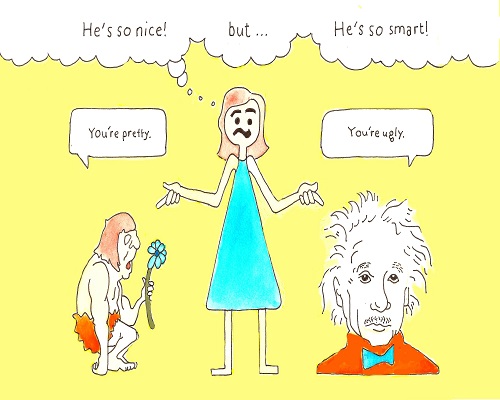Create Praise.
Are you a nice caveman or a mean Einstein? Would you like to be a nice Einstein? Too bad.
Research shows that when you criticize someone, people think you are mean but smart. And when you praise someone, people think you are nice but less intelligent.
We are attracted to people who are both smart and nice. If we can’t be both, is it better to be nice and dumb or smart and mean? It depends.
Our actions prompt reactions in other people who quickly form opinions about us. They then act according to what they perceive to be true about us. So the question is: What actions can we take that would cause others to perceive us as smart and nice – both attractive human traits?
This question is important for educators to understand when designing online courses. If students perceive our course to be dumb or mean-spirited, they will stop taking the course and choose a course they feel is smarter and nicer. Nobody has time in their lives to spend with dumb meanies.
Byron Reeves and Clifford Nass discuss this conflict in their book The Media Equation. They focus part of their research on how we respond to praise and criticism. In one study, they explore four possible combinations: other-praise, self-praise, self-criticism, and other-criticism.
They found that our perceptions of someone are easily affected by what we hear about them. We believe any praise and criticism we hear about another person, regardless of how credible the source.
They conclude that when a computer program praises a student, the student perceives their own work to be better quality than their work that is criticized. To motivate a student to continue pursuing their own success, it is wise to praise them each step of their way during a course.
When we want our course itself to be considered smart or high quality by a potential student, then we must have other people endorse its quality. A course that praises itself will be perceived as less valid than when the praise comes from an independent source.
Possible ways to establish quality and credibility are by using a five-star user-evaluation system and include written comments by satisfied students.
We could also use positive reviews from other web sites to endorse our courses. This is because someone who praises others or is praised by others will be liked more than someone who praises themself.
We should avoid criticizing other competitor courses directly. If we want to criticize our competitors, we should use a surrogate like quoting from a separate blog that criticizes them. This is because someone who criticizes another person or program will be liked less than someone who criticizes themself.
We should avoid criticizing a student. Even though our course will be perceived by them to be smarter or higher quality than one which praises them, they will enjoy the experience less which increases the chance of losing the student.
When a course must decide to be perceived as either smart or nice, most designers choose smart.
While designing our courses, however, it is best to be nice and praise our students as they progress through the lessons. They might think we are dumb, but they will be more motivated to continue learning.
To help us decide for ourselves what kind of course we want to create for students – a nice course which praises students or a mean one which criticizes their work – the authors pose the question, “When you think about the teachers that you value the most, are they the ones who were most intelligent, or those who knew enough, and were nice?”
